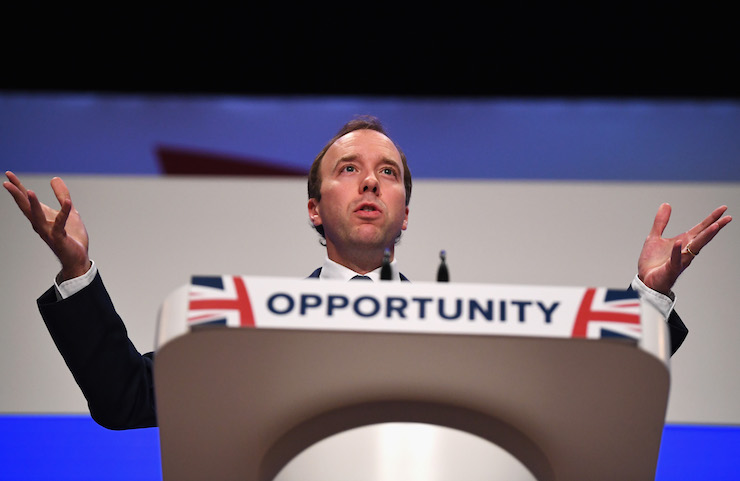So much of this Conservative conference has felt like a holding line from the party leadership, as though having the event in Birmingham has been inconvenient timing and something to survive, rather than enjoy. Mind you, this is the theme of Theresa May’s leadership generally: not only has the Prime Minister survived against the odds over the past year and a half, she has also given the impression that this survival is more important than, say, making decisions on Britain’s future trading relationship with the EU, or pushing ahead with domestic reform.
If you want a domestic example of how cautious the Tories are being at this conference, you need look no further than Matt Hancock’s speech in the hall today. The Health Secretary is an ebullient type, unable to contain his enthusiasm about new technology that he believes can help the health service, and clearly delighted to have such a high-profile Cabinet job. But he was limited to announcing a very small cash injection for the social care system, and merely hinting that the party was working on the bigger reforms that the sector has needed for over a decade. Hancock told the hall:
‘I can announce that today I am making an extra £240 million available to pay for social care packages this winter to support our NHS. We’ll use this money to get people who don’t need to be in hospital but do need care back home, back into their communities, so we can free up those vital hospital beds and help people who really need it get the hospital care they deserve.’
The detail of these packages is that local councils will receive money through the adult social care relative needs formula to spend on domestic care packages, reablement packages – which are short-term programmes of care designed to help people returning home from hospital to re-learn the skills they need to continue living independently – or housing adaptations. It is not, apparently, being reallocated from existing budgets and is instead new money from the Treasury.
But it is nowhere near enough to cover the shortfall in funding that councils are facing overall. Hancock acknowledged this in his speech, saying:
‘We need other reforms too. We’ve got to reform the system so we spend more time on prevention not sure, with more integration between health and social care and more treatment closer to home.’
He then added:
‘Reform of social care is long overdue and we’ll publish a paper later this year setting out the progress we can make to give all people confidence and dignity in old age.’
The progress of this much-delayed green paper, though, has been slower than Boris Johnson running through a field of weeds and long grass. It means that those working in Whitehall have accepted that the government will not actually implement any reforms to the social care system in this parliament, which means that Hancock, for all his ebullience and optimism about the prospects for the NHS, has been forced to produce the same holding line coming from his seniors on other matters such as Brexit, housebuilding and the economy.







Comments